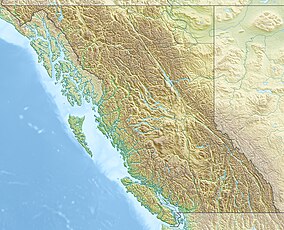
Back منتزه غواي هاناس الوطني Arabic Taman Nasional Cagar Palemahan Gwaii Haanas miwah Situs Tetamian Haida BAN Gwaii Haanas Danish Gwaii-Haanas-Nationalpark German Nacia Park-Rezervejo Gwaii Haanas kaj Ĥajda Heredaĵejo Esperanto Parque nacional Gwaii Haanas y sitio patrimonial Haida Spanish پارک ملی گوآی هائاناس Persian Gwaii Haanasin kansallispuisto Finnish Réserve de parc national et site du patrimoine haïda Gwaii Haanas French Parco nazionale Gwaii Haanas Italian
| Gwaii Haanas National Park Reserve and Haida Heritage Site | |
|---|---|
 | |
Location of Gwaii Haanas National Park Reserve in British Columbia Location of Gwaii Haanas National Park Reserve in Canada | |
| Location | Haida Gwaii, British Columbia, Canada |
| Nearest city | Sandspit |
| Coordinates | 52°23′21″N 131°28′16″W / 52.38917°N 131.47111°W |
| Area | 1,470 km2 (570 sq mi) |
| Established | 1988 |
| Governing body | Gwaii Haanas Archipelago Management Board |
| Website | parks |
Gwaii Haanas National Park Reserve, National Marine Conservation Area, and Haida Heritage Site, usually referred to simply as Gwaii Haanas (/ˌɡwaɪ ˈhɑːnəs/), is located in southernmost Haida Gwaii (formerly known as Queen Charlotte Islands), 130 kilometres (81 miles) off the mainland of British Columbia, Canada. Gwaii Haanas protects an archipelago of 138 islands, the largest being Moresby Island and the southernmost being Kunghit Island. "Gwaii Haanas" means "Islands of Beauty" in X̱aayda kíl, a southern dialect of the Haida language.
The Haida Heritage Site is within the territory of the Haida people, who have lived in Haida Gwaii for at least 14,000 years.[2][3] Ḵ'aygang.nga (the Haida canon of oral histories) say Haida lived in Gwaii Haanas when the first trees arrived at Xaagyah Gwaay.yaay (Bolkus Islands) as glaciers retreated. Pollen samples indicate trees first arrived 14,500 years ago.[4]
Numerous films have covered Gwaii Haanas, including the 2011 short National Parks Project, directed by Scott Smith and scored by Sarah Harmer, Jim Guthrie and Bry Webb.[5]
- ^ "Protected Planet | Gwaii Haanas National Park Reserve Of Canada And Haida Heritage Site". Protected Planet. Retrieved 2020-10-13.
- ^ Fedje, Daryl W (2005). Human History from the Time of the Loon to the Time of the Iron People. Vancouver, BC: UBC Press. p. 151. ISBN 978-0-7748-0921-4.
- ^ "Earliest sign of human habitation in Canada may have been found". cbc.ca. Canadian Broadcasting Corporation. Retrieved 30 October 2018.
- ^ "Ts'ahl Arrives" (PDF). Haida Laas. Council of the Haida Nation: 3. April 2017. Retrieved 30 October 2018.
- ^ Knight, Chris (May 19, 2011). "Film Review: National Parks Project (3 stars)". The National Post.

